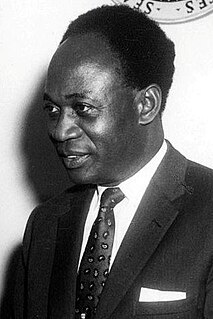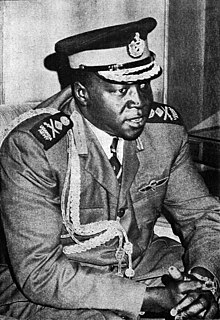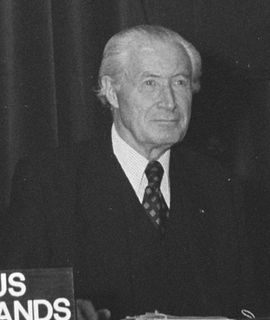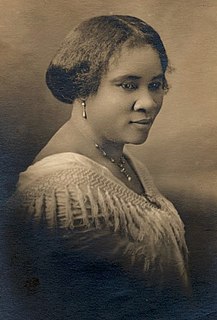Related Research Articles

Kwame Nkrumah was a Ghanaian politician and revolutionary. He was the first Prime Minister and President of Ghana, having led the Gold Coast to independence from Britain in 1957. An influential advocate of Pan-Africanism, Nkrumah was a founding member of the Organization of African Unity and winner of the Lenin Peace Prize from the Soviet Union in 1962.

A senate is a deliberative assembly, often the upper house or chamber of a bicameral legislature. The name comes from the ancient Roman Senate, so-called as an assembly of the senior and therefore considered wiser and more experienced members of the society or ruling class.

Idi Amin Dada Oumee was a Ugandan military officer who served as the President of Uganda from 1971 to 1979. Popularly known as the "Butcher of Uganda", he is considered one of the most brutal despots in world history.

Edwin Duncan Sandys, Baron Duncan-Sandys, was a British politician and minister in successive Conservative governments in the 1950s and 1960s. He was a son-in-law of Winston Churchill.

Madam C.J. Walker was an African American entrepreneur, philanthropist, and political and social activist. She is recorded as the first female self-made millionaire in America in the Guinness Book of World Records. Multiple sources mention that although other women might have been the first, their wealth is not as well-documented.

Shirley Anita Chisholm was an American politician, educator, and author. In 1968, she became the first black woman elected to the United States Congress, representing New York's 12th congressional district for seven terms from 1969 to 1983. In the 1972 United States presidential election, she became the first African-American candidate for a major party's nomination for President of the United States, and the first woman to run for the Democratic Party's presidential nomination.

Lillian Randolph was an American actress and singer, a veteran of radio, film, and television. She worked in entertainment from the 1930s until shortly before her death. She appeared in hundreds of radio shows, motion pictures, short subjects, and television shows.
Kofi Abrefa Busia was a Ghanaian political leader and academic who was Prime Minister of Ghana from 1969 to 1972. As a nationalist leader and prime minister, he helped to restore civilian government to the country following military rule.

The Prime Minister of the Philippines was the official designation of the head of the government of the Philippines from 1978 until the People Power Revolution in 1986. A limited version of this office existed temporarily in 1899 during the First Philippine Republic.
Naomi Long Madgett was an American poet and publisher. Originally a teacher, she later found fame with her award-winning poems and was also the founder and senior editor of Lotus Press, established in 1972, a publisher of poetry books by black poets. Known as "the godmother of African-American poetry", she was the Detroit poet laureate since 2001.

Trish Van Devere is a retired American actress. She was nominated for a Golden Globe Award for the film One Is a Lonely Number (1972), and won a Genie Award for the film The Changeling (1980). She is the widow of actor George C. Scott, with whom she appeared in multiple films.

Willye Brown White was an American track and field athlete who took part in five Olympics from 1956 to 1972. She was America's best female long jumper of the time and also competed in the 100 meters sprint. White was a Tennessee State University Tigerbelle under Coach Ed Temple. She was African-American. The above picture is of team mate Marilyn White.
Bridget Rose Dugdale, better known as Rose Dugdale, is a former debutante who rebelled against her wealthy upbringing, becoming a volunteer in the militant Irish republican organisation, the Provisional Irish Republican Army (IRA). As an IRA member, she took part in the theft of paintings worth IR£8 million and a bomb attack on a Royal Ulster Constabulary (RUC) station using a hijacked helicopter.
Perry Deane Young was a journalist, author, playwright, historian, and professional gardener. He was the author of Two of the Missing, about fellow journalists Sean Flynn and Dana Stone, who went missing during the Vietnam War and whose fates remain unknown, and the co-author of The David Kopay Story, a biography of 1970's professional football player David Kopay, who revealed in 1975 that he was gay.

Diana Budisavljević was an Austrian humanitarian who led a major relief effort in Yugoslavia during World War II. From October 1941, on her initiative and involving many co-workers, she organized and provided assistance to mostly Serbian Orthodox women and children detained in the Ustaše camps in the Independent State of Croatia, a Nazi puppet state established in occupied Yugoslavia. The operation, known as "Action Diana Budisavljević", succeeded in saving around 10,000 children. Budisavljević described the course of the Action in a diary, starting with 23 October 1941 and the final entry on 7 February 1947. The diary was released in Croatian in 2003. After her story was better publicized in 2012, she received substantial posthumous recognition.

Nancy Batson Crews was one of the original women to participate in the Women's Auxiliary Ferrying Squadron (WAFS) during World War II.
Carl McClellan Hill was an American educator and academic administrator who served as president of Kentucky State University from 1962 to 1975, and as the 11th president of Hampton University from 1976 to 1978.

David Colville Smith was a farmer and politician in Rhodesia and its successor states, Zimbabwe Rhodesia and Zimbabwe. He served in the cabinet of Rhodesia as Minister of Agriculture from 1968 to 1976, Minister of Finance from 1976 to 1979, and Minister of Commerce and Industry from 1978 to 1979. From 1976 to 1979, he also served Deputy Prime Minister of Rhodesia. He continued to serve as Minister of Finance in the government of Zimbabwe Rhodesia in 1979. In 1980, he was appointed Minister of Trade and Commerce of the newly independent Zimbabwe, one of two whites included in the cabinet of Prime Minister Robert Mugabe.

Pak Kyong-suk was a North Korean politician. She was a seamstress in Kim Il-sung's guerrilla forces during the 1930s. After the liberation of Korea, she held posts in the Workers' Party of Korea (WPK), Democratic Women's League, as well as being a delegate to the Supreme People's Assembly.
References
- ↑ Raph Uwechue (1991). "Nwanak, Sarah". Africa Who's who. Africa Journal Limited. p. 1306. ISBN 978-0-903274-17-3.
- ↑ "Nwanak, Sawah (Mme)". Les élites camerounaises. Mediafric-IC publications. 1987. p. 362. ISBN 978-2-402-23264-7.
| | This Cameroonian biographical article is a stub. You can help Wikipedia by expanding it. |